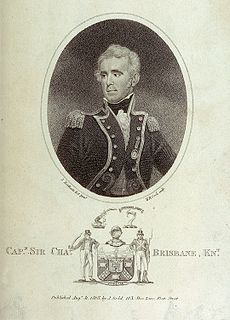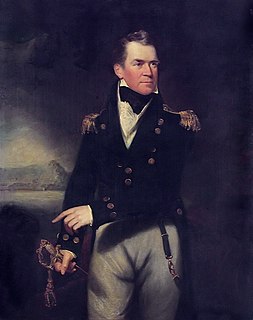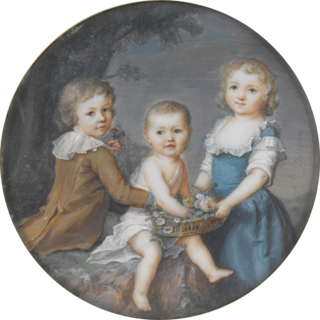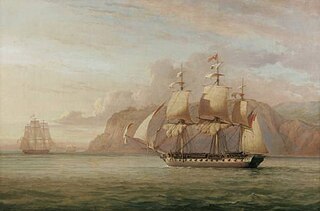
Sir John Orde, 1st Baronet was the third son of John Orde, of Morpeth, Northumberland, and the brother of Thomas Orde-Powlett, 1st Baron Bolton. Remembered as a professional enemy of Nelson, Orde's quarrel was actually more with Lord St Vincent and he never attacked Nelson personally.

Rear Admiral Sir Thomas Troubridge, 1st Baronet was a Royal Navy officer. As a junior officer he saw action at the Battle of Sadras in February 1782 during the American Revolutionary War and the Battle of Trincomalee in September 1782 during the Anglo-French War. He commanded the third-rate Culloden at the Battle of Cape St Vincent in February 1797 during the French Revolutionary Wars. He went on to be First Naval Lord and then served as Commander-in-Chief, East Indies Station during the Napoleonic Wars.
Rear-Admiral Sir Edward Thomas Troubridge, 2nd Baronet, was an officer of the British Royal Navy who served in the French Revolutionary, Napoleonic and War of 1812. He later served for fifteen years as the member of parliament for Sandwich, Kent.

Sir Charles Brisbane KCB was an officer of the Royal Navy who served during the American War of Independence, and with distinction under Lords Hood and Nelson.

Admiral Sir James Whitley Deans Dundas GCB was a Royal Navy officer. He took part in the Napoleonic Wars, first as a junior officer when he took part in the Anglo-Russian invasion of Holland in Autumn 1799 and later as a commander when he was in action at Copenhagen Dockyard shortly after the capture of that City in August 1807. He also served as Whig Member of Parliament for Greenwich and then for Devizes and became First Naval Lord in the First Russell ministry in July 1847 and in that role his service was dominated by the needs of Whig party. He was appointed Commander-in-Chief in the Mediterranean in 1852 and led all naval operations in the Black Sea including the bombardment of Sevastopol in October 1854 during the Crimean War.

Vice-Admiral Sir Thomas Francis Fremantle, was a British naval officer in the Royal Navy whose accolades include three separate fleet actions, a close friendship with Lord Nelson, and a barony in Austria.
Rear-Admiral Charles James FitzGerald, 1st Baron Lecale PC (Ire), styled Lord Charles FitzGerald between 1761 and 1800, was an Irish naval commander and politician.

Admiral of the Fleet Sir Charles Morice Pole, 1st Baronet GCB was a Royal Navy officer and colonial governor. As a junior officer he saw action at the Siege of Pondicherry in India during the American Revolutionary War. After taking command of the fifth-rate HMS Success he captured and then destroyed the Spanish frigate Santa Catalina in the Strait of Gibraltar in the action of 16 March 1782 later in that War.
Granville Leveson Proby, 3rd Earl of Carysfort, known as The Honourable Granville Proby until 1855, was a British naval commander and Whig politician.
Sir Richard Dacres was an officer of the British Royal Navy who saw service during the American War of Independence, and the French Revolutionary and Napoleonic Wars. A member of a substantial naval dynasty, he eventually rose to the rank of vice admiral.

Sir George Ralph Collier, 1st Baronet KCB was an officer of the Royal Navy during the French Revolutionary and Napoleonic Wars, and the War of 1812. He had an eventful early life, being shipwrecked early in his career and later captured by the French. Nevertheless, he saw enough service to attract the attention of powerful patrons that secured his rise through the ranks. An officer of considerable ability, he won a noteworthy victory against a stronger French opponent, before embarking on a period of distinguished service off the Spanish and Portuguese coasts, working closely with the British generals fighting the Peninsular War, and markedly contributing to their success. His good service led to a prime posting in command of a squadron despatched to hunt down and neutralise the American super frigates during the War of 1812. He came close to capturing the USS Constitution, but lost her in circumstances that were unclear and would later return to haunt him. The years of peace that followed the end of the Napoleonic Wars saw him rewarded with a baronetcy, and his continued to serve in the navy where he was tasked with the suppression of the slave trade. The publishing of William James's account of the War of 1812, which lambasted him for incompetence and cowardice in his failure to catch the Constitution, broke his personal peace. Having failed to clear his name, and increasingly depressed by the accusations, Collier took his own life.
HMS Daedalus was a 32-gun fifth rate frigate of the Royal Navy, launched in 1780 from the yards of John Fisher, of Liverpool. She went on to serve in the American War of Independence, as well as the French Revolutionary and Napoleonic Wars.

Admiral George Stewart, 8th Earl of Galloway, styled Lord Garlies between 1773 and 1806, was a British naval commander and politician.
HMS Favourite was a 16-gun Cormorant-class sloop of the Royal Navy, launched in 1794 at Rotherhithe. The French captured her in 1806 and renamed her Favorite. However, the British recaptured her in 1807 and renamed her HMS Goree. She became a prison ship in 1810 and was broken up in Bermuda in 1817.

Lord Robert Seymour was a British politician who sat in the Irish House of Commons from 1771 to 1776 and in the British House of Commons from 1771 to 1807. He was known as Hon. Robert Seymour-Conway until 1793, when his father was created a marquess; he then became Lord Robert Seymour-Conway, but dropped the surname of Conway after his father's death in 1794.

John Bastard of Sharpham, Ashprington, Devon, was an officer of the Royal Navy who saw service during the French Revolutionary and Napoleonic Wars, and the War of 1812, rising to the rank of post-captain. He also entered politics and became a Member of Parliament.

Samuel Hood Linzee was an admiral of the British Royal Navy who served during the French Revolutionary and Napoleonic Wars.
Edward King was a Royal Navy officer who represented Roscommon for several years in the United Kingdom Parliament.
Admiral Robert Honyman was a Scottish admiral in the British Royal Navy who served in the French Revolutionary Wars and in the Napoleonic Wars. A native of Orkney, he also held office for ten years as a member of parliament (MP) for Orkney and Shetland.


















